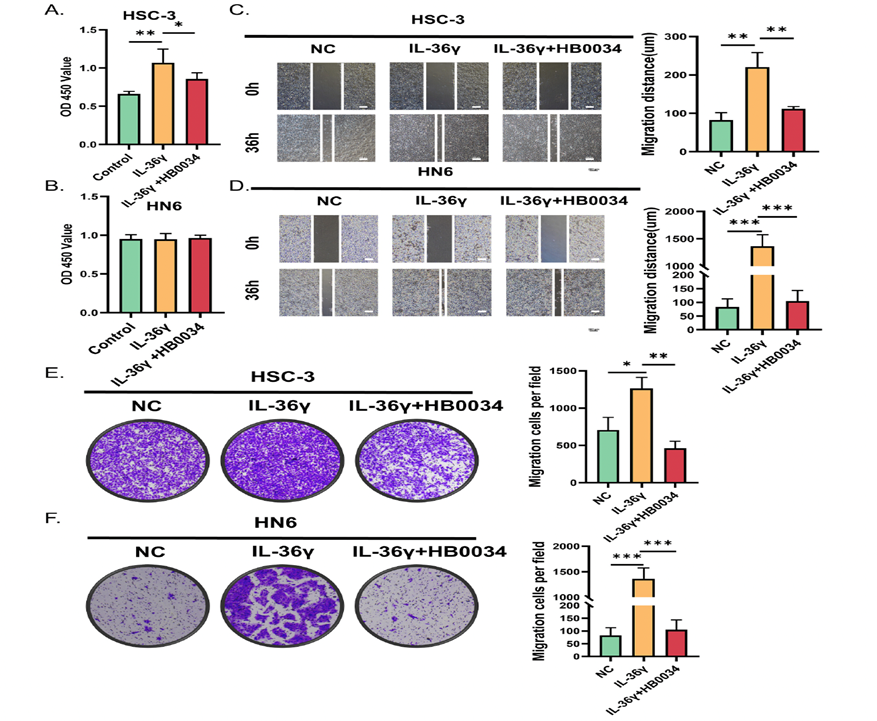Research and Development
Dr. Zhan Yifan, the chief scientist of Shanghai Huaota Biopharmaceutical Co., Ltd, a subsidiary of Zhejiang Huahai Pharmaceutical Co., Ltd (hereinafter referred to as "Huaota"), as the co-corresponding author, published a paper titled "IL-36 antagonism blunts the proliferation and migration of oral" in the academic journal Cellular Signalling.
https://doi.org/10.1016/j.cellsig.2024.111096
The corresponding authors are Dr. Zhan Yifan, Professor Ni Yanhong and Sun Guowen from the Stomatological Hospital Affiliated to Nanjing University School of Medicine. In this publication, the relationship between IL-36 and the growth and migration of oral squamous cell carcinoma was mainly explored. In vitro experiments showed that the anti-IL-36R monoclonal antibody HB0034 inhibits the growth and migration of OSCC tumors, providing a basis for possible new treatment options.
HB0034 is a humanized IgG1 monoclonal antibody targeting IL-36R independently developed by Huaota Biotechnology. It can specifically bind IL-36R and block IL-36 inflammatory pathway signals. It is intended to be used to treat generalized pustular psoriasis (GPP), hidradenitis suppurativa (HS), and pustular gangrene (PG). HB0034 has completed the Phase Ia/Ic study of healthy people in New Zealand and the Phase Ib study of GPP patients in China. The critical Phase II starts in early 2024.
Excellent clinical safety and efficacy results have been observed for HB0034, especially in patients with severe generalized pustular psoriasis. A single injection of HB0034 can achieve close to 100% pus recovery in more than 77% of patients within one week. The results have been selected as a poster for the 2023 European Annual Meeting of Dermatology (EADV), and the project is currently actively looking for overseas partners.
Article Summary
Head and neck cancer (HNSCC) is the seventh most common type of cancer in the world, half of which are oral squamous cell carcinoma (OSCC). Current treatments for OSCC mainly include surgery, radiotherapy, chemotherapy and comprehensive treatment, but local treatment failure and/or distant metastasis still plague OSCC patients. Therefore, it is urgent to find new treatment directions. As a key factor in transmitting signals between cells, cytokines have been found to play a crucial role in tumor development.
IL-36 belongs to the IL-1 family and consists of three agonists, namely IL-36α, IL-36β and IL-36γ. These ligands bind to IL-36R and send signals to promote inflammation by inducing the expression of a series of proteins. However, the IL-36 signaling pathway has also been implicated in cancer. Previous studies have shown that IL-36 cytokines promote tumor progression in the colon, stomach, and lungs. This paper mainly explores the role of IL-36 in oral squamous cell carcinoma (OSCC).
By analyzing the expression of IL-36 ligands and receptors, this study founds that the expression of IL-36γ in head and neck cancer (HNSCC) was significantly higher than that in normal tissues, and IL-36γ can stimulate OSCC cell proliferation and migration. Relevant to cancer immunotherapy is that anti-IL-36R mAb HB0034 can inhibit IL-36γ-induced proliferation and migration of OSCC cells (Figure 1). The latest results from Huaotai Biotech also prove that HB0034 can inhibit the growth of tumors in vivo.

Figure 1
Figure 1. HB0034 inhibits the pro-proliferation and migration effects of IL-36γ. (A) CCK8 analyses of HSC-3 treated with IL-36γ _with or without addition of HB0034. B) CCK8 analyses of HN6 treated with IL-36γ _with or without addition of HB0034. (C) The representative images and quantitative analyses of wound healing assay of HSC-3 treated with IL-36γ _with or without addition of HB0034. (D) The representative images and quantitative analyses of wound healing assay of HN6 treated with IL-36γ _with or without addition of HB0034. (E) The representative images and quantitative analyses of transwell assay of HSC-3 treated with IL-36γ _with or without addition of HB0034. (F) The representative images and quantitative analyses of transwell assay of HN6 treated with IL-36γ _with or without addition of HB0034. Scale bar:200 μm. * p < 0.05, * * p < 0.01, * * * p < 0.001.
Dr. Yifan Zhan's Profile
Dr. Yifan Zhan is currently serving as the Chief Scientific Officer of New Drug Development at Shanghai Huaota Biopharmaceutical Co., Ltd. In this role, he is responsible for selecting new targets for large-molecule drugs, establishing conjugated drug platforms, and developing immunocellular functional platforms.
Dr. Yifan Zhan earned his Ph.D. in Immunology from the University of Melbourne in Australia and later worked at the Walter and Eliza Hall Institute of Medical Research in Australia. He has dedicated his career to research in the field of cellular immunology. He has made significant contributions to areas such as immune cell activation, differentiation, survival, cell interactions, and the production of cytokines and antibodies. Dr. Zhan has published over 100 academic papers in top international journals.

About Huaota
Huaota Biopharmaceutical is a global biopharmaceutical research and development company primarily focused on independent research that concentrates on the development of biopharmaceuticals in areas such as oncology, autoimmune diseases, and retinal diseases. Currently, there are 11 projects in the clinical stage, including the first domestic IL-36R monoclonal antibody designed for pustular psoriasis (a rare disease), which is about to enter a critical Phase II trial. A PD-L1/VEGF bispecific antibody shows positive signals in clinical Phase II trials for endometrial cancer, renal cancer and advanced lung cancer, etc. Additionally, there is a core project like CD73-ADC, the first agent with dual-targeted killing effects for difficult-to-treat cancers like pancreatic cancer.
Huaota Biopharmaceutical is actively seeking domestic and international partners to collaborate and advance these projects that aim to provide high-quality, advanced biological drugs to the global market, meeting the demand for accessible and affordable biopharmaceuticals. The vision is to innovate and change the world through these efforts.